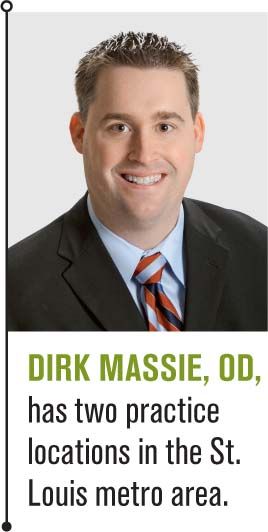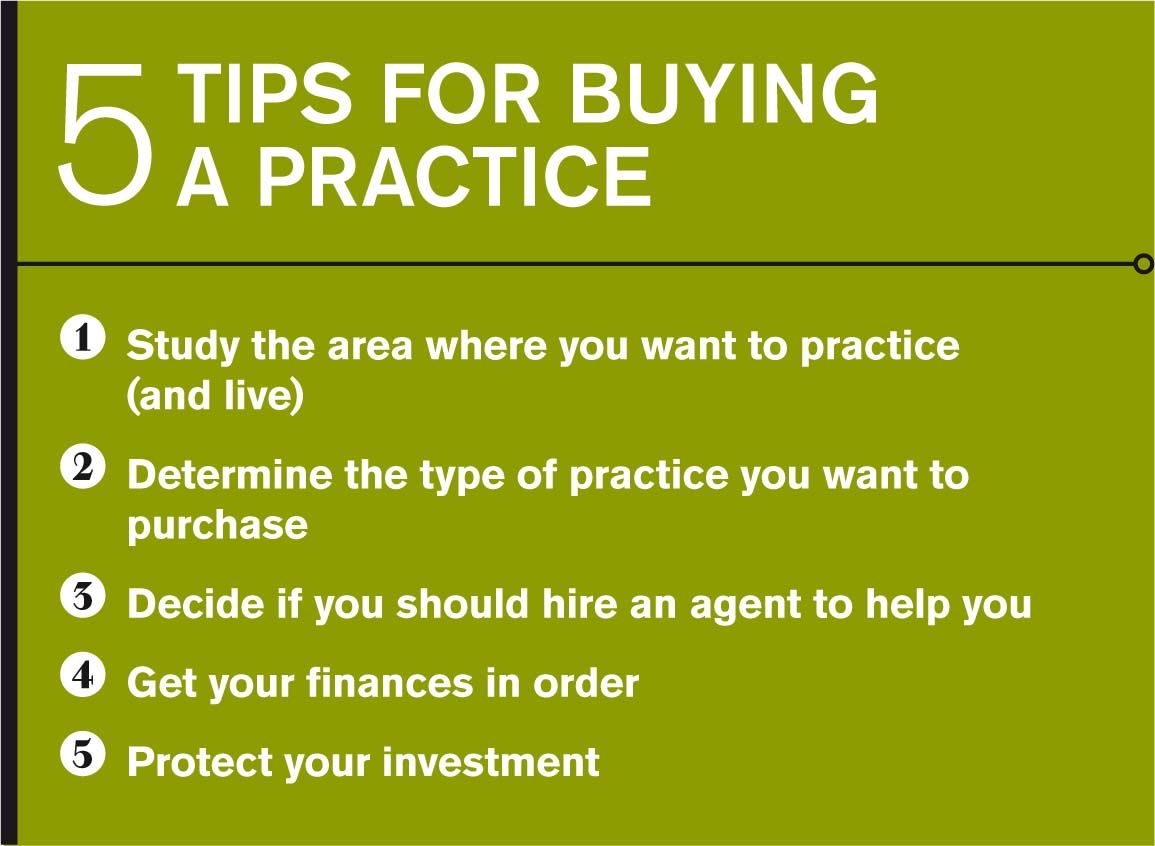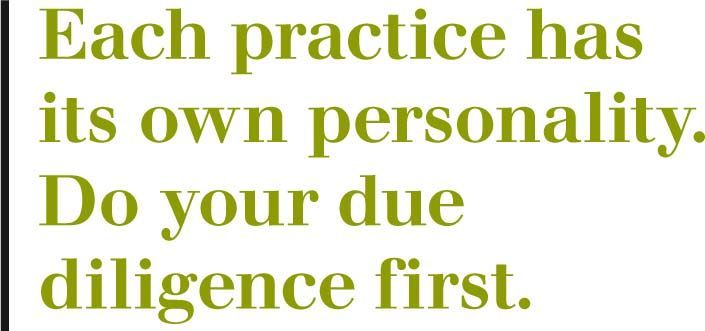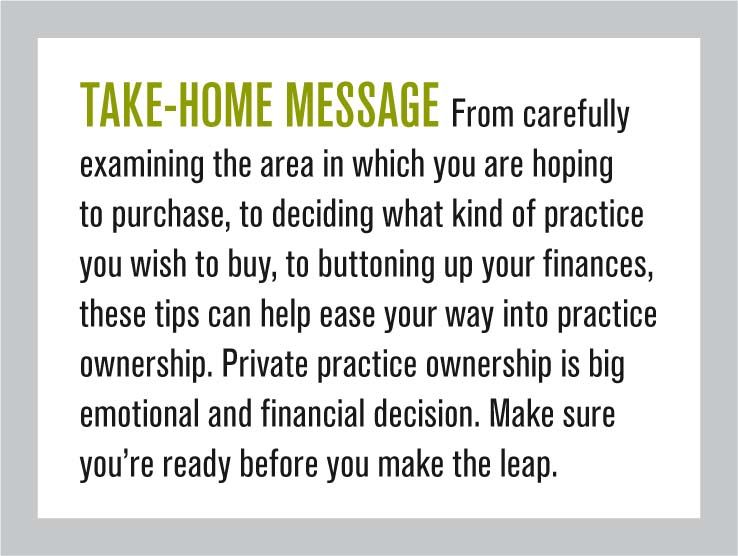5 tips to prepare for practice purchase
Purchasing a private practice is a big decision and requires thorough preparation. The practice that you purchase can determine where you live and where your children go to school, and it ultimately shapes the lifestyle you’ve been dreaming about your entire life.

Purchasing a private practice is a big decision and requires thorough preparation. The practice that you purchase can determine where you live and where your children go to school, and it ultimately shapes the lifestyle you’ve been dreaming about your entire life.
When the practice purchase is conducted properly, it will provide a great income throughout your career. Typically, owners of a private practice can earn considerably more than employed practitioners. One of the best features of owning a private practice is that you build equity in the practice (and sometimes also the building in which you practice). Another big advantage with owning your practice is total freedom-freedom to care for your patients in the manner that is in line with your philosophy, and freedom to make your own schedule. Careful planning is necessary when making such a big investment decision.
Here are five tips you should know before you take the plunge into practice ownership.
More from Dr. Massie: 5 tips to prepare to sell your practice

1. Study the area where you want to practice (and live)
Ideally, practice owners live in the same city where their practice is located. While it is not a must, being involved in the community where you practice has long been a driver of growth in private practice. As you are searching for the perfect area to practice, I suggest conducting demographic research and obtaining information about the school systems to nail down your desired area.
You’ll need to weigh the pros and cons of the area for both personal and business reasons. Be sure that the city is a good fit for you, and determine the need for your services in your desired area. During your search, it is important to remain flexible-there can be limited opportunities for a given city depending on the size and the number of private practice owners who could potentially be retiring soon.
Determine the type of practice you want to purchase
2. Determine the type of practice you want to purchase
Do you want to purchase a smaller practice for a low price and work hard to turn it into a full-time practice? There are several smaller practices coming onto the market as baby boomers are starting to retire. Several of these practices have annual revenue of only about $400,000 and can usually be purchased for under $250,000. With hard work and dedication, a young practice owner can grow the practice rapidly. In fact, I did that myself. I bought a practice grossing $375,000 a year, and within five years our annual sales were over $1,000,000.
More practice management: How I prosecuted an embezzling employee
If you prefer to not work so hard to turn around a smaller practice, consider buying a larger practice. While a large practice comes at a higher price, there is usually not much additional investments needed; a smaller, older practice often needs an office remodel and updated equipment. A large practice purchase is often structured as a junior partnership in which the younger partner slowly learns about practice ownership from the senior partner. However, large practices grossing over $1,000,000 can also be purchased outright just as a smaller practice.
Ultimately, it comes down to the exit strategy for the seller and if he wants to remain working in the practice. Unfortunately, many young prospective buyers have been promised an opportunity to “buy into a practice” when they are hired on as an associate only to be led along for years with the practice purchase never coming to fruition. This happens for various reasons but mostly because the selling doctor overvalues her practice. The best way to avoid this situation is to have the practice appraised prior to ever seeing your first patient. The terms of the employment contract should include details of a possible practice purchase if/when it happens.

In my experience, private practices are as unique as the owner. Each practice has its own personality, and the buyer (and his agent) should do his due diligence to dig deep and find out what the practice is truly like.
Decide if you should hire an agent to help you
3. Decide if you should you hire an agent to help you
Do you have spare time to search for potential practices for sale? Are you comfortable knowing if the terms of the sale are fair and reasonable? If you answered “no” to either of those questions, then you should seek out the help of a practice broker.
In case you missed it: 13 holiday dos and don'ts for ODs
A practice broker can be a huge help with buying a practice. Some of their services include:
• Determine the type of practice that is suitable for the buyer
• Confidentially search for the practice, freeing up the buyer to continue working full time
• Perform a fair market valuation of the practice
• Negotiate the terms of the transaction and assist the buyer through closing
• Help the buyer obtain financing for the purchase
“You make your money when you purchase” is a longstanding phrase used by real estate investors and accountants. It is crucial not to overpay for your new practice, and a practice broker can help you avoid making that mistake.
Get your finances in order
4. Get your finances in order
Despite having significant student loan debt, practice buyers are typically suitable for financing, sometimes for 100 percent of the sale price, for purchasing a private practice. Banks want to see good credit scores, minimal credit card debt, and personal tax returns showing high levels of income in recent years. If the prospective buyer has a spouse who works, that is very appealing to banks who finance private practices.
More practice management: 5 tips for planning a successful event at your practice
One variable banks examine is your debt-to income ratio. If you are serious about buying a practice soon, I recommend saving your money and limiting your debt. Hold off on buying that new car or home until after you’ve settled into your new practice. After all, the car expenses can be paid by your future practice!
Protect your investment
5. Protect your investment

The goodwill of the selling doctor can be the largest portion of your investment when purchasing a practice. If the selling optometrist will no longer be working in the practice, it is important to have her sign a non-compete agreement so she doesn’t suddenly become your competitor and take all the patients with her.
In fact, patient retention should be your primary focus when purchasing an existing practice. The seller should agree to pose for a photo with you that you can mail out in a letter announcing you as the new owner. Ideally, the seller stays on for one to two years to help with the transition so she can verbally tell all the patients how great you are. Even if the seller works only one or two days per week for a period of time, it makes for a very smooth transition and a higher percentage of patients will stay with the practice.

Congratulations if you’re considering owning your own private practice! In recent years, we’ve seen negativity surrounding private practice ownership due to the Affordable Care Act (ACA), ICD-10 implementation, and meeting meaningful use guidelines. However, despite some of those challenges, private practices provides a wonderful opportunity to provide a high standard of care and excellent customer service that will result in a successful practice that patients will appreciate and will provide you with a great lifestyle. Best of luck with your quest to find your dream practice.
Click here to check out the latest practice management advice
Newsletter
Want more insights like this? Subscribe to Optometry Times and get clinical pearls and practice tips delivered straight to your inbox.